In addition to its beaches and paradisiacal landscapes, Cabo Verde shares a cultural treasure with the world. Cape Verdean morna is an intoxicating melody that encapsulates the essence of the archipelago. More than a musical genre, morna is a reflection of the soul of Cape Verdeans, full of stories that tell of nostalgia and everyday life on the islands.
Morna in retrospect: from traditional roots to international recognition
Morna is the voice of an island people, which through the sound of the guitar echoes deep feelings of longing and nostalgia. Rooted in the Cape Verdean soul, this music envelops the heart, conveying ‘morabeza’ - the hospitality and warmth characteristic of Cape Verdeans.
Slow rhythms, poetic lyrics and a melancholic melody make up the essence of this genre, which is almost a musical embrace, full of emotions and untold stories.
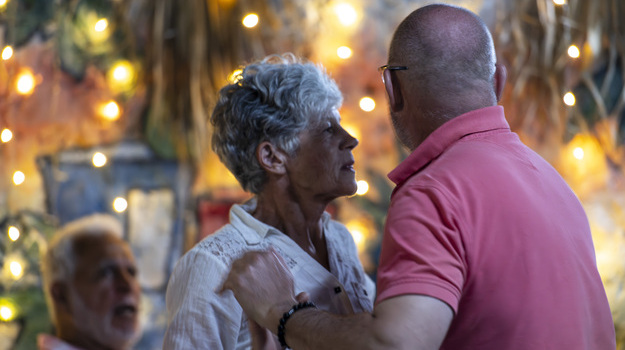 On Fogo Island, a couple dancing to the sound of a morna
On Fogo Island, a couple dancing to the sound of a morna
With deep roots, morna was born between the islands of Boa Vista and Brava, around 200 years ago, in a mixture of African, Portuguese and Latin American influences. Over time, it spread throughout the archipelago, becoming a symbol of Cape Verdean culture.
Each island added a particular touch, enriching the genre and moulding it into the morna we know today.
Morna has transcended borders, won over the world and the well-deserved UNESCO, classification as Intangible Cultural Heritage of Humanity. This international recognition put Cabo Verde on the cultural map and honoured a genre that not only tells stories, but also preserves the memory of a people.
The legends of morna: composers and performers who marked history
Maria Barba, the pioneering singer
Born on Boa Vista Island, Maria Barba is an emblematic figure in the history of morna, recognised as one of the pioneers.
Barba managed to capture the essence of Cape Verdean nostalgia at a time when morna was still consolidating itself as a genre of its own.
Her legacy remains as a symbol of strength and cultural authenticity, which is revealed through her passion for morna, influencing generations of Cape Verdean musicians.
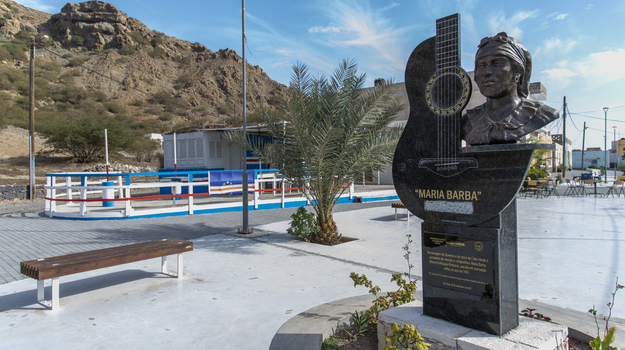 Tribute to Maria Barba, in Povoação Velha, where she was born, on Boa Vista Island
Tribute to Maria Barba, in Povoação Velha, where she was born, on Boa Vista Island
Eugénio Tavares, the poet of morna
Considered the greatest poet of morna, Eugénio Tavares, born on Brava Island, gave voice to deep feelings of love, longing and loss and elevated morna to a literary and cultural level that consolidated it as a national symbol.
His poetry captured the soul of the Cape Verdean people, making him an essential figure for understanding morna.
His lyrics are still sung today and continue to convey great emotional intensity.
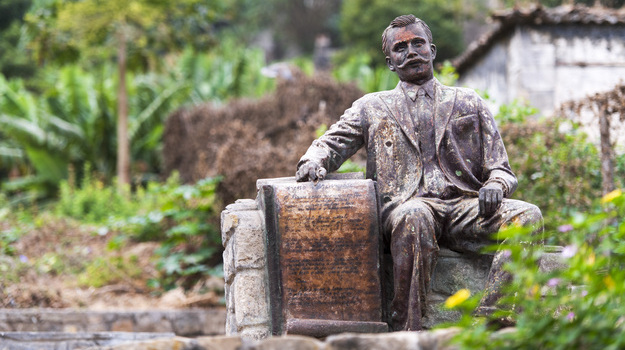 Tribute to Eugénio Tavares, in Nova Sintra, on Brava Island
Tribute to Eugénio Tavares, in Nova Sintra, on Brava Island
B. Leza and musical innovations
Born on the island of São Vicente, Francisco Xavier da Cruz, better known as B. Leza, brought innovation to the morna, adding complex chords and harmonies that enriched the musical style.
B. Leza is remembered for his boldness in modernising the genre without losing its essence. With influences from fado and samba, he introduced the so-called Brazilian ‘halftone’ to morna, which gave it a new texture and depth.
His revolutionary approach helped shape the evolution of morna, paving the way for new interpretations.
Cesária Évora, the queen of morna
Born on the island of São Vicente, Cesária Évora, with her unmistakable voice and unrivalled interpretation, took morna to international stages.
Her rendition of the iconic ‘Sodade’ became an anthem of Cape Verdean nostalgia, expressing a melancholy and emotional truth that made her immortal in music.
The ‘barefoot diva’ didn't just sing; she felt the morna, and through her, Cape Verdean music found its place in the hearts of millions of people around the world.
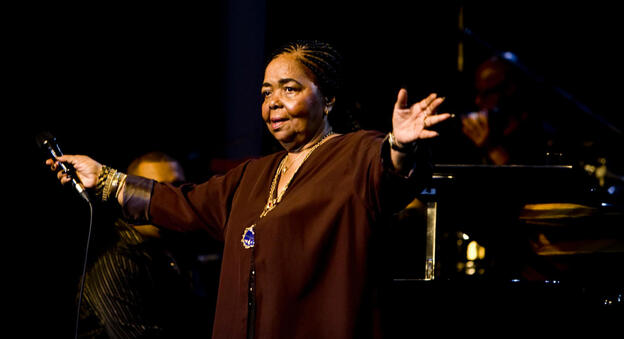 Cesária Évora on stage
Cesária Évora on stage
Photo: Nuno Fox / Global Imagens Via: Delas
Emblematic mornas that marked generations
Immortalised by Cesária Évora, ‘Sodade’ is the anthem of the morna, which gives voice to the emotion of nostalgia. This song captures the universal feeling of absence and the desire for reunion. No heart can remain indifferent when listening to this melody that has conquered the world.
Iconic songs like ‘Força di Cretcheu’, ‘Mi Ma Mi’, ‘Porton d nos ilha’, ‘Caminho de Mar’, ‘Maria Bárba’, ‘Rocha Scribida’, and so many others, have opened a window to the soul of the archipelago, transporting us to the alleys, bars and squares of Cabo Verde.
How to feel the warm weather in Cabo Verde
Museums and culture centres
The museums dedicated to music in Cabo Verde offer a journey through the history of morna, with exhibitions and stories of composers and performers.
These spaces are a meeting point with Cape Verdean memory and culture:
- Casa da Morna Sodade, in Tarrafal, on the Island of São Nicolau.
- Eugénio Tavares Museum House and Morna Study Center, in Nova Sintra, on Brava Island.
- Cesária Évora Museum Center, in Mindelo, on the Island of São Vicente.
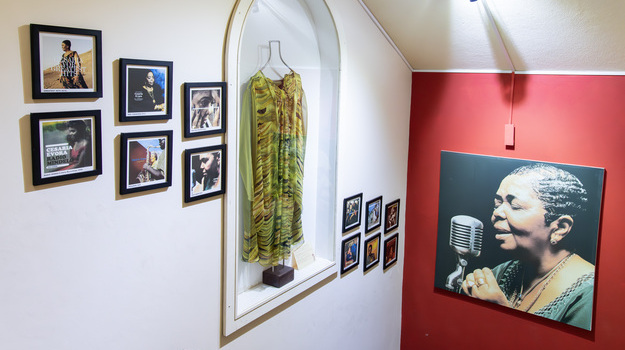 Cesária Évora Museum Center, in Mindelo, on the Island of São Vicente
Cesária Évora Museum Center, in Mindelo, on the Island of São Vicente
Morna Houses
On all the islands there are places where you can hear the morna live, in an intimate and immersive experience. These music venues keep the tradition alive, being obligatory stops for anyone who wants to feel the heat to its fullest.
 Morna on Fogo Island
Morna on Fogo Island
Festivals and events dedicated to morna
Since February 2018, morna has been celebrated on December 3rd, the birth day of composer and musician Francisco Xavier Da Cruz – B.Leza.
Morna Fest or Sodadi Festival d´Morna, held annually on São Nicolau Island, are examples of local celebrations that bring together local and international musicians to pay homage to morna.
Outside of Cabo Verde, across the world, there are also festivals that celebrate morna, reinforcing its global impact and allowing more people to experience this enchanting music.
Morna: more than music, a way of being
Morna is more than a musical style; It is a cultural manifestation that sums up the essence of Cabo Verde. It is the symbol of identity, resistance and collective memory.
In addition to art, it is an expression of the Cape Verdean spirit, a form of communication that brings people together and tells the story of a resilient people, always connected to their roots.
In Cabo Verde, you will have the opportunity to feel morna in its purest essence. Whether in restaurants and bars with live music, or in homes and cultural centres that preserve the memory of those who contributed to the spread of morna throughout the world.
Plan your trip to Cabo Verde and feel the warmth in its essence.





